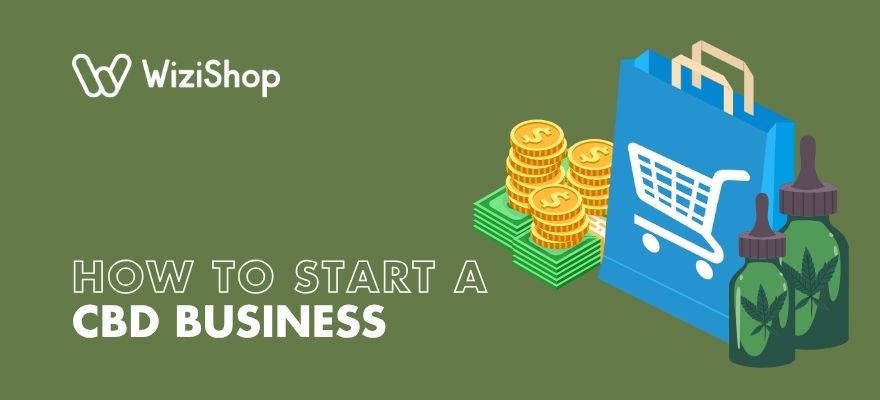It cannot be denied that CBD’s popularity has skyrocketed in recent years.
According to Statista, while the estimated CBD usage rate among adults in the US was 6% in 2018, this percentage was expected to reach 35% by 2024.
Awareness of the health benefits of CBD, involving pain management, assistance with anxiety, and other treatments, has increased significantly, leading to extensive growth in the CBD industry, with new businesses appearing regularly.
If you’ve been considering launching your own CBD business, now is a wonderful moment to do so, especially if you plan to have an online store.
In fact, Statista notes that ecommerce sales of CBD in the US were approximately $1.96 billion in 2021 and are predicted to surpass 6 billion U.S. dollars by 2026!
In this detailed article, we’ll explain exactly what CBD is and provide you with a 9-step plan to getting started with your own CBD business.
What is CBD?
Cannabidiol (CBD) is a naturally occurring chemical compound known as a cannabinoid. It can be found, along with over 100 other cannabinoids, in cannabis and hemp plants.
Hemp-derived CBD comes from hemp plants with less than 0.3% tetrahydrocannabinol (THC), making it federally legal in many regions.
Cannabis-derived CBD comes from marijuana plants and may contain higher THC levels, making it subject to stricter regulations.
CBD that comes from hemp doesn’t lead to intoxication during consumption.
It is said to, however, supply a number of potential health and therapeutic benefits and can be found in a variety of items sold both online and offline.
To create these goods, the plants must first be grown and harvested, and then CBD oil can be extracted from the plants.
The extracted CBD oil can be sold on its own or added to different products, such as gummies, chewing gum, mints, gels, creams, etc.
Steps for starting a CBD business
Although it’s impossible to know how long CBD products will be in demand, the current stats indicate that interest isn’t likely to go away in the near future.
If you’ve been considering starting your own CBD business, now’s an excellent time to begin.
Here are 9 steps to follow to help start your company off on the right foot.
1. Ask yourself why you want to create a CBD business
Understanding why you have a desire to launch any business is advantageous, whether you want to start an online boutique for your own clothing line or create an ecommerce site to sell candles, as it can assist you as you make important decisions regarding your new venture.
However, knowing your “why” when it comes to starting a CBD business may be even more beneficial.
This is because although selling CBD products can be very rewarding, it also comes with its own set of unique challenges, especially regarding the strict rules that many countries have for the sale of these types of goods.
When you’re faced with tough situations, remembering your motivation for your business can be just what you need to get through challenges successfully.
Specific questions you may want to answer to help clarify your reasoning for creating a CBD store include the following:
- Will this business be a full-time job or more of a side gig?
- Does it involve a completely new career change for you?
- Are you planning on owning your business for the long haul or putting it up for sale a few years down the road?
2. Decide on your niche and products
Once you have a good understanding of why you want to start your own CBD business, you’re ready to decide on a specific niche and the products that you want to sell.
While it would be great to sell something that would appeal to every single shopper, it’s just not possible.
Targeting a specific niche to fill in the market and focusing on a smaller group of consumers will give your business a much better chance of being able to stand out from the competition and achieve success.
When it comes to CBD products, you’ll find that there are a plethora of types of goods available today, with the release of new items likely on the horizon.
Generally categorized by the way the product is consumed, here are the different groups of CBD products to consider for your own business:
- Capsules and pills
Especially popular with people who prefer taking CBD instead of over-the-counter medication, this type of product is frequently encased in gelatin or offered in a soft gel format.
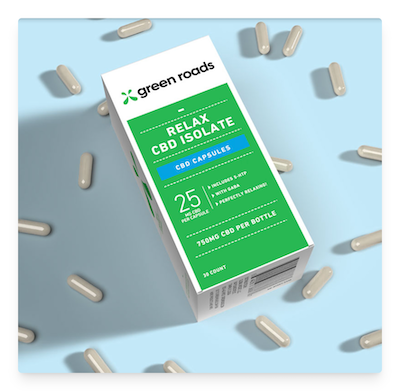
CBD capsules by Green Roads
- Drops and sprays
Often featuring flavoring agents for more enjoyable ingestion, these products contain CBD oil combined with a carrier oil such as medium-chain triglyceride (MCT), hemp seed, avocado, or coconut for better absorption.
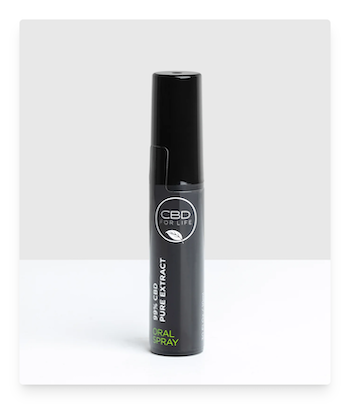
CBD oral spray by CBD For Life
- Edible items
Appeal to snack-loving consumers by offering CBD-infused treats like candy, chocolate, gummies, etc.—perfect for those who want to enjoy the benefits of CBD but who aren’t big fans of the taste of hemp.
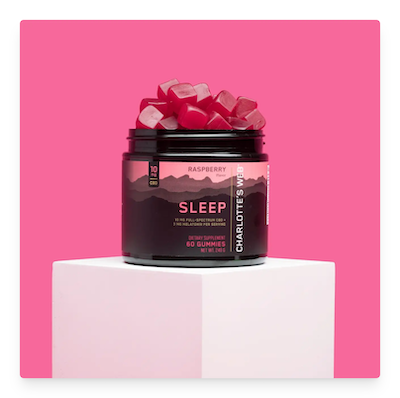
CBD gummies by Charlotte’s Web
- Sublingual tinctures
This kind of product makes it possible to feel the effects of CBD more quickly and is usually provided in a small bottle and accompanied with a dropper, allowing the user to place the CBD oil (mixed with alcohol or another solvent) under the tongue for faster absorption.
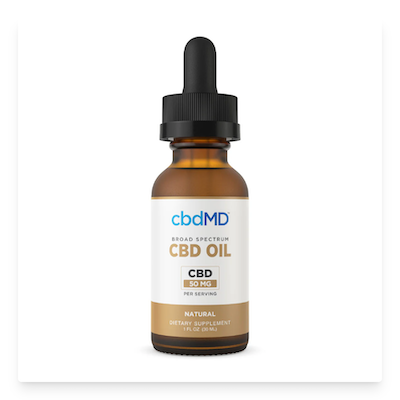
CBD oil tincture by cbdMD
- Topical goods
Ideal for targeted areas on the body, topicals like CBD-based creams, ointments, gels, and patches can be applied directly to the skin to offer relief from pain and/or soreness.
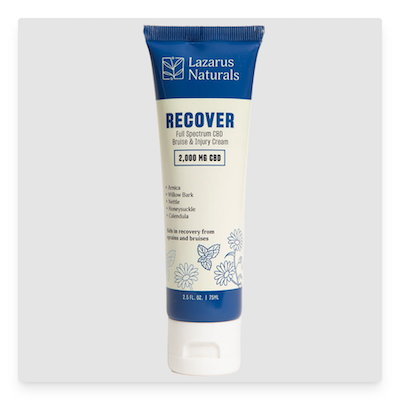
CBD cream by Lazarus Naturals
- Vapes and cartridges
These goods are often enjoyed by people who use CBD for its pain-relieving effects, as consumption via inhalation allows for faster absorption, as well as those who simply like vaping for the social aspect.
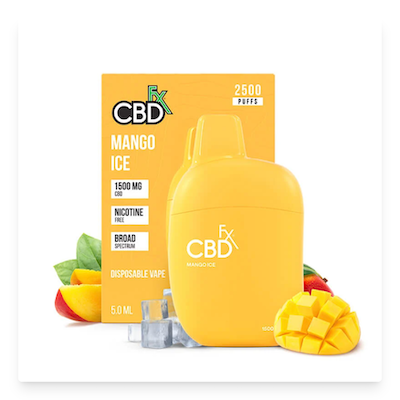
CBD vape pen by CBDfx
Based on an April 2022 survey by Statista, the most used CBD product in the US is gummies or other edibles, with 58% of respondents stating that they consume this CBD product. This was followed closely by capsules, oils/tinctures, and lotions.
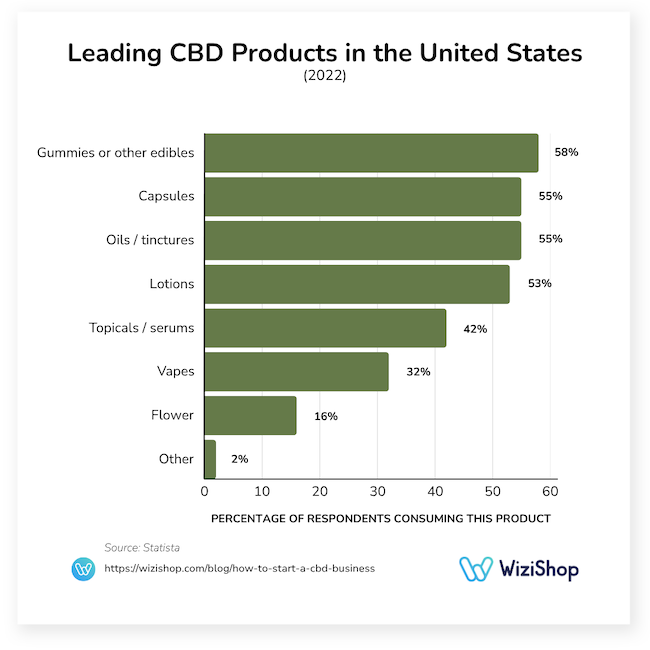
Take note that while CBD products are very popular with humans, there’s also an ever-growing market for CBD-related items for pets!
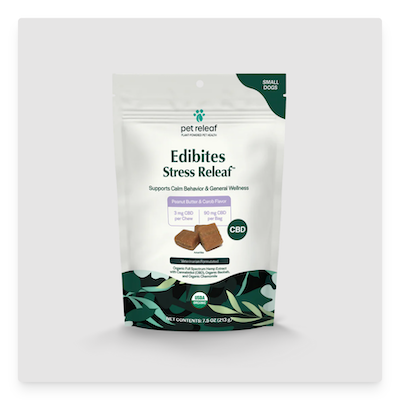
CBD chews for dogs by Pet Releaf
Though different dosages are of course required for pet products, CBD pet products can provide shoppers’ furry family members with the same benefits that they themselves enjoy, including relief for pain, anxiety, etc.
3. Research CBD laws and regulations for your location
As mentioned earlier, the sale of CBD products generally necessitates following a long list of rules.
Although the length of this list will vary depending on where your business is based and where you wish to sell your products, you’ll want to be sure to research the laws and regulations concerning the sale of CBD for your location carefully.
This is a highly scrutinized industry, so thoroughly understanding the current rules and staying up to date with any changes that occur to ensure compliance are absolutely essential.
After devoting loads of time, energy, and financial resources to your business, the last thing you need is to risk having to pay a huge fine or even shut your store down due to not following the regulatory policies as carefully as you should.
While you’ll need to review the exact laws applicable to your business according to your location, one of the top elements that you’ll likely need to pay close attention to is the maximum level of THC allowed in your products.
⚠️ Important: Don’t forget that federal regulations in the US say that CBD must contain 0.3% THC or less, but state regulations for this amount can differ.
4. Create a business plan
As with the launch of any new business, creating a business plan for your CBD business is key to ensuring that you’re starting off on the right foot.
A well-crafted business plan is all the more important if you hope to secure funding for your venture, as people tend to be extra cautious about investing in CBD businesses and will want to be sure that yours is indeed legitimate.
To help you structure your business plan, here are several sections to include:
- Executive summary
This section serves as the introduction to your business plan, so it should therefore be engaging to pique people’s interest and make them want to keep reading.
Offer a brief explanation of your CBD business and its status. You should then provide a short synopsis of each of the following sections of your document.
- Company analysis
Here, you’ll go into greater detail about the type of CBD business you have.
This section should explain the kinds of products you sell, why and when you decided to launch your business, any milestones your business may have already accomplished, and the legal structure of your business.
- Market analysis
Researching the market is not only beneficial to allowing you to increase your knowledge of the CBD industry and ensure that your business is on the right track but also to showing potential investors that you’re a serious organization.
In this section of your business plan, add all relevant information concerning the size of the industry, current trends, expected growth, competitors, customers, and any other variables that may affect the market and therefore your business.
- Marketing plan
Specify how you aim to get the word out about your new CBD business, attract new customers, and build loyalty around your business so that shoppers return for repeat purchases.
While coming up with a strong, data-backed marketing strategy can be a long process, it’s well worth the effort, and it can save you a considerable amount of money in the long run.
- Operations plan
In this section, you’ll explain how you plan to achieve your goals for your business. Describe your day-to-day tasks involving areas such as product development, marketing, manufacturing, etc..
Next, you can go into detail about your long-term goals and objectives, including any specific dates you have in mind for reaching them.
- Management team
Highlight your team’s skills and experience to further bolster your business in the eyes of potential investors. This will ideally involve expertise in the management of CBD businesses, but it’s certainly not a requirement.
If you’re running a solo operation, you can discuss your own skills and experience and/or talk about any people you work with who serve as business mentors.
- Financial plan
Create and share a budget for your CBD business, detailing key costs while also being sure to allow extra room for any unplanned expenses that may occur.
Explain how much you expect it to cost to start your venture and how you aim to finance it.
5. Obtain any necessary documents/licenses
Regardless of where you’re based, there’s an excellent chance that you’ll need to obtain certain documents or licenses to ensure that you’re running a legal CBD business.
For instance, you may need to get a business license and/or a reseller license (if you wish to buy CBD from wholesalers).
In addition, you’ll likely need to register your business with your government authorities and request a tax ID number for your new company to be able to declare and file business taxes correctly.
Don’t forget to also check to see what kind of insurance you’ll need to have and what labeling requirements you may need to follow when it comes to selling CBD goods and ensure that you label your products accordingly.
6. Locate a CBD supplier
Unless you’re going to be growing hemp plants and producing your own CBD, you’ll need to make sure that you locate a reliable and reputable CBD supplier for your business.
Performing thorough research here is essential, as it’s important to find a supplier who follows your location’s laws concerning the levels of THC allowed.
Professional CBD wholesalers should be able to provide you with a Certificate of Analysis (COA) specifying the potency of the product’s contents.
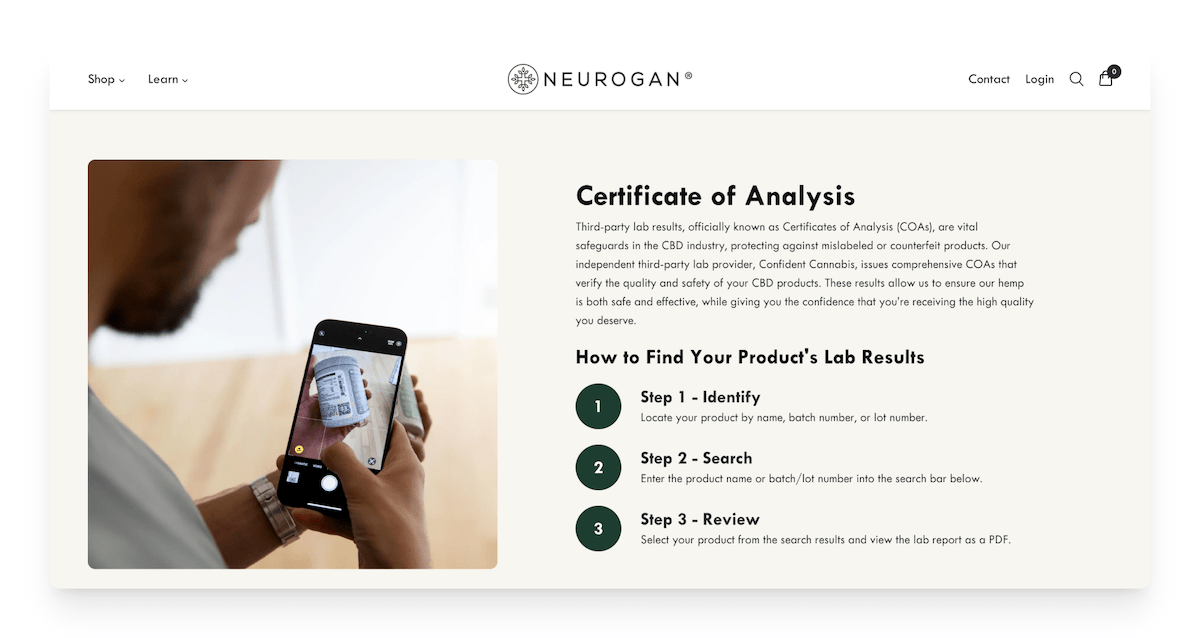
Neurogan Certificate of Analysis
Your chosen supplier should also be able to supply you with results concerning the testing of pesticides, bacteria/mold, and stray chemicals, ensuring that you have a high-quality product to sell to your customers.
Finally, the CBD you obtain from your supplier must provide the effects that shoppers seek when purchasing CBD goods. There are unfortunately many fake CBD products on the market, and if yours is labeled a “scam,” you’ll risk finding it difficult to improve your brand’s reputation.
You’ll also need to decide if you’re going to be creating your own products (e.g., candies, hand cream, etc.) or purchasing them from a wholesaler.
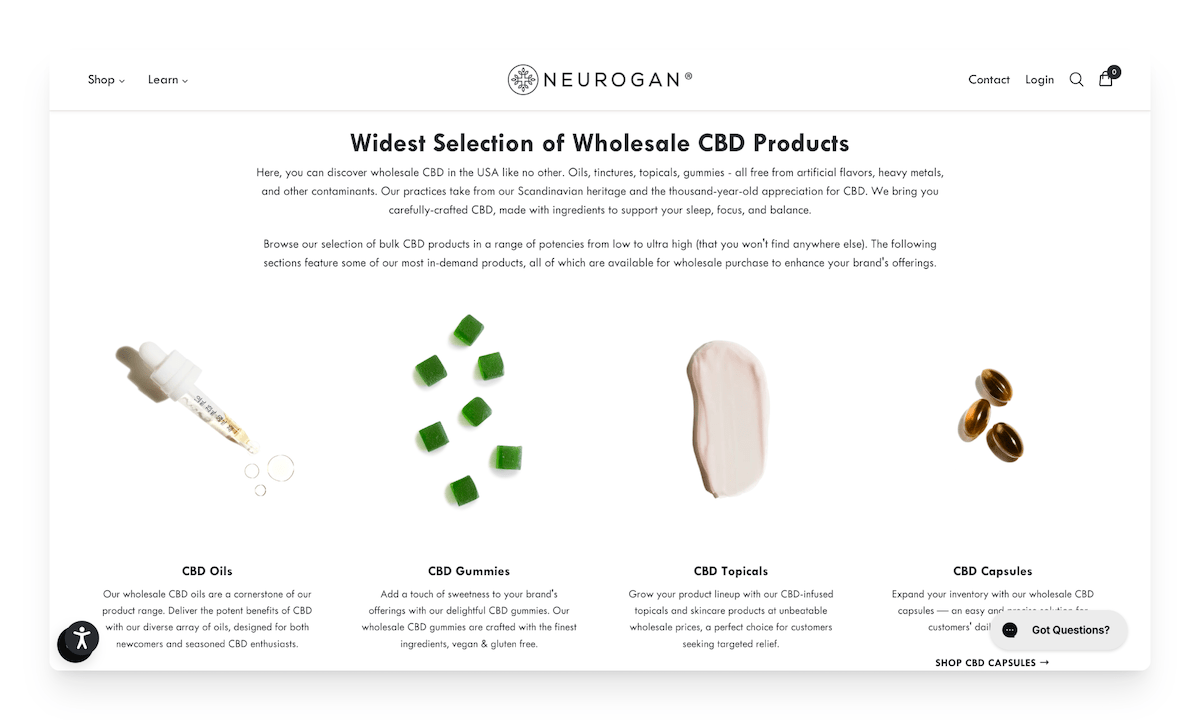
Wholesale CBD supplier Neurogan
After obtaining quality CBD from your supplier, putting your own creations up for sale will give you more control over your products. However, purchasing items from a wholesaler will save you time and is ideal if you’re looking to launch your CBD business quickly.
7. Determine your pricing strategy
You’ll now need to decide how to price your CBD products. This step is rather important, as you need to be sure to charge enough to make your small business profitable, but you don’t want to make your products so expensive that nobody wants to buy them!
At this point, you’ll have already done your market analysis and researched what your competitors are charging for their goods. Although you may not be charging the exact same price for your offerings, this can be a great starting point when determining the best pricing strategy for your venture.
You’ll of course also need to consider all the various costs associated with your business operations, everything from creating/procuring your products to marketing, product packaging, shipping, storage, website hosting, and more. Ask yourself how much of a profit you hope to earn with the sale of each item.
You might also brainstorm different ways to make your CBD business more profitable.
For example, maybe you can’t go beyond a certain price level for individual products, but you could perhaps offer product bundles as a way to entice your customers and increase your average cart value.
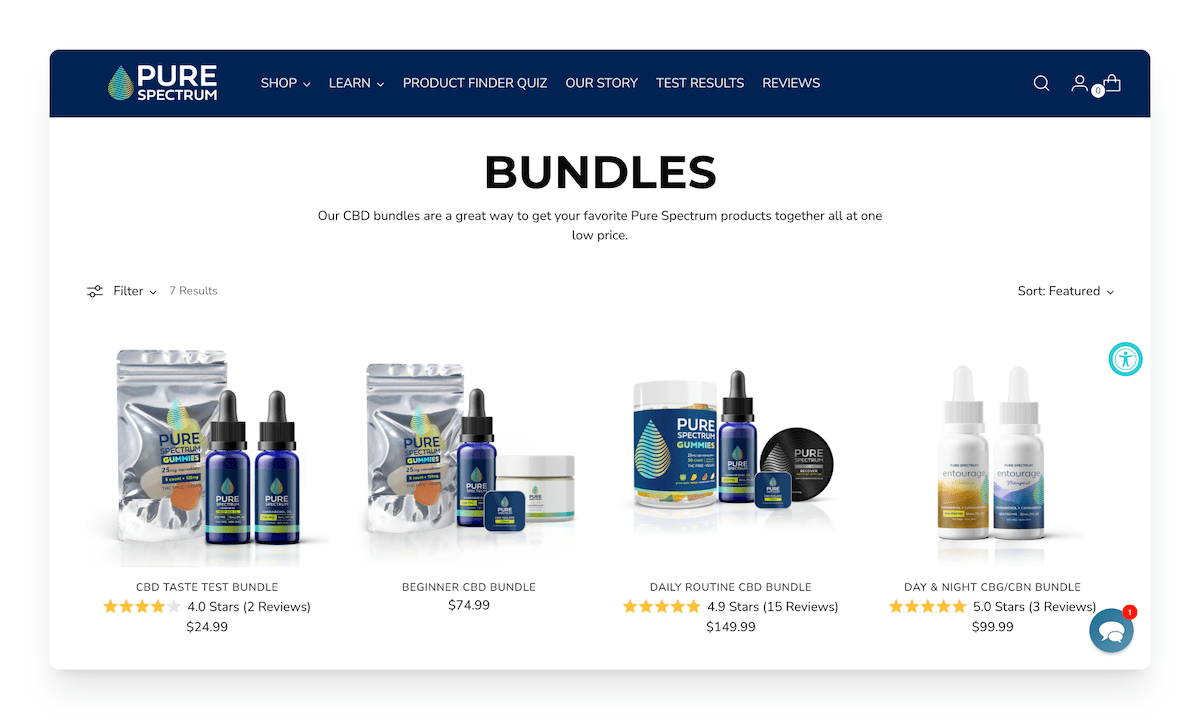
CBD product bundles available on the Pure Spectrum website
8. Build your ecommerce website
Once you have your CBD products priced and ready to go, you’ll be ready to build your ecommerce website and start selling!
Creating your own online store for your CBD business isn’t a mandatory step. You could opt to sell your products in brick-and-mortar shops, at outdoor markets, on online marketplaces, or even your own physical store.
However, having your own ecommerce site will give you the most flexibility and allow you to reach a greater number of consumers to boost your sales. Furthermore, it’s also generally a more budget-friendly way to go about launching a new business than some of the other strategies mentioned above.
Of course, if you do decide to go the ecommerce route and create your own website, you’ll want to be sure to select a stellar ecommerce platform that meets your needs.
Keep in mind that some solutions may not permit the sale of CBD goods because of complicated local and federal rules, so remember to verify this factor before you commit to a platform.
With the WiziShop ecommerce solution, you’ll be able to choose from a wide range of design templates to create a CBD sales site that best suits the vision you have for your brand.
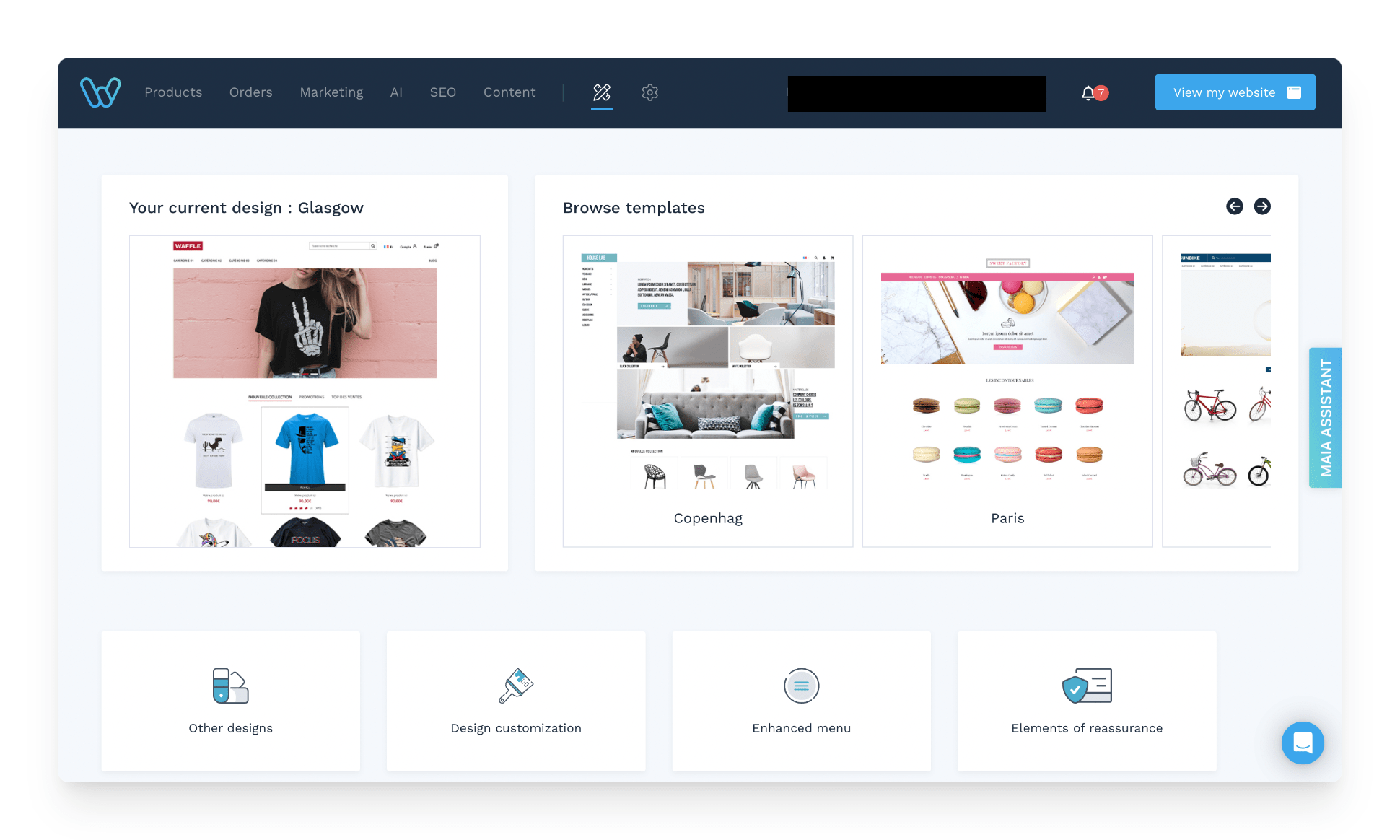
Numerous design templates available on the WiziShop platform
Then, WiziShop’s powerful AI lets you create product pages in just a few clicks!
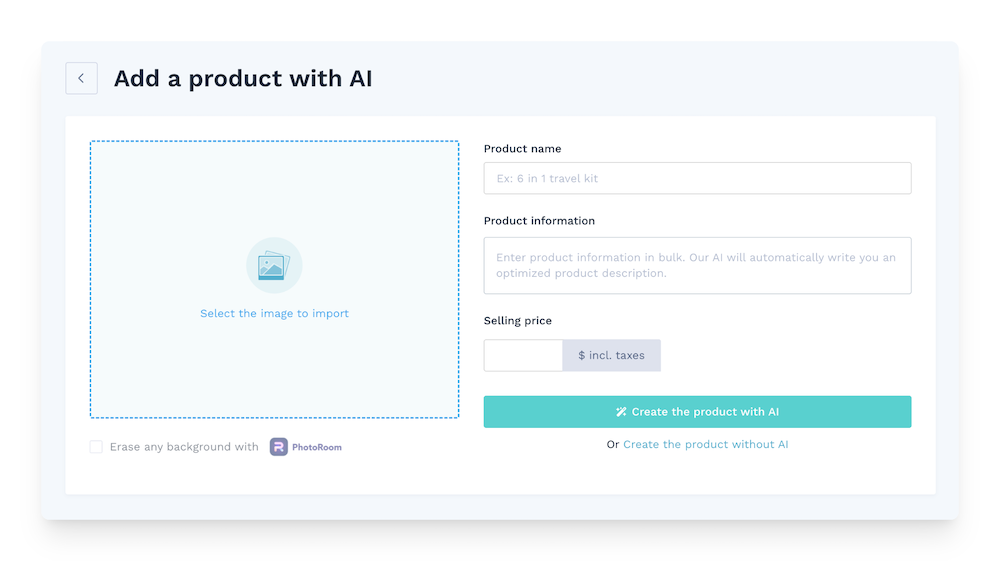
Add products with AI in your WiziShop dashboard
In addition, the AI allows you to generate blog posts, translations, FAQs, lists of pros and cons, ad copy, and more.
You’ll also benefit from free training to boost your knowledge of all kinds of ecommerce-related topics, access to our helpful team of Business Coaches to assist you with any questions you may have concerning managing your ecommerce site and the growth your business, a variety of payment methods and processors, numerous delivery solutions, and hundreds of integrated features to increase your conversions.
What’s more, WiziShop puts a significant focus on SEO, providing you with over 50 tools designed to optimize your website’s SEO and improve your site’s rankings on search engines like Google.
Why not test the solution out today and see for yourself why it’s the best option for your new CBD business?
Enjoy a 7-day free trial with no commitment!
Try WiziShop free for 7 days
THE EASIEST NO-CODE ECOMMERCE SOLUTION✅ No credit card required
✅ Access to all features
✅ No commitment
After you’ve selected your ecommerce platform, there are several things to keep in mind as you begin adding your CBD products to your website.
When determining the total cost of starting an online boutique, note that you’ll want to add high-quality product images that show off your items in the best way possible.
If you’re able to hire a professional to take photos of your products, wonderful! If not, that’s completely okay; it’s still very possible to create great product photos yourself on a budget.
Second, be careful when writing your product descriptions. While they should be engaging and convincing, it’s even more important that they’re based purely on facts and are accurate when it comes to CBD products.
Depending on your country’s laws, you may also need to avoid using language that suggests that your offerings can cure or prevent any diseases or provide other health benefits that haven’t been scientifically proven.
9. Market your CBD business
Once your online store is live, it’ll be time to put your marketing strategy to work in order to promote your CBD business and reach as many potential customers as possible!
Attracting the right audience to your ecommerce site can be tricky and even more so when selling CBD products. This is because there’s often some confusion that surrounds these goods, which can lead to shoppers’ hesitancy to make a purchase.
That being said, a solid marketing strategy will take this into account and prioritize educating consumers about CBD and the benefits of products featuring this ingredient.
Consider implementing the following actions to make the most of your marketing strategy:
- Optimize your SEO
With the growing interest in CBD, it’s no surprise that new online stores featuring CBD products are cropping up all the time.
To drive traffic to your own ecommerce site, you’ll need to work on optimizing your SEO, with the aim of getting your store to show up in the top results of the SERP.
This is where keyword research comes in handy!
By researching trending topics and keywords with tools such as Google Trends, Yourtext.Guru, Ubersuggest, and Semrush, you’ll be able to determine what subjects and terms you should have in the various areas of your website, including your homepage, product pages, and blog, as well as on your social networks.
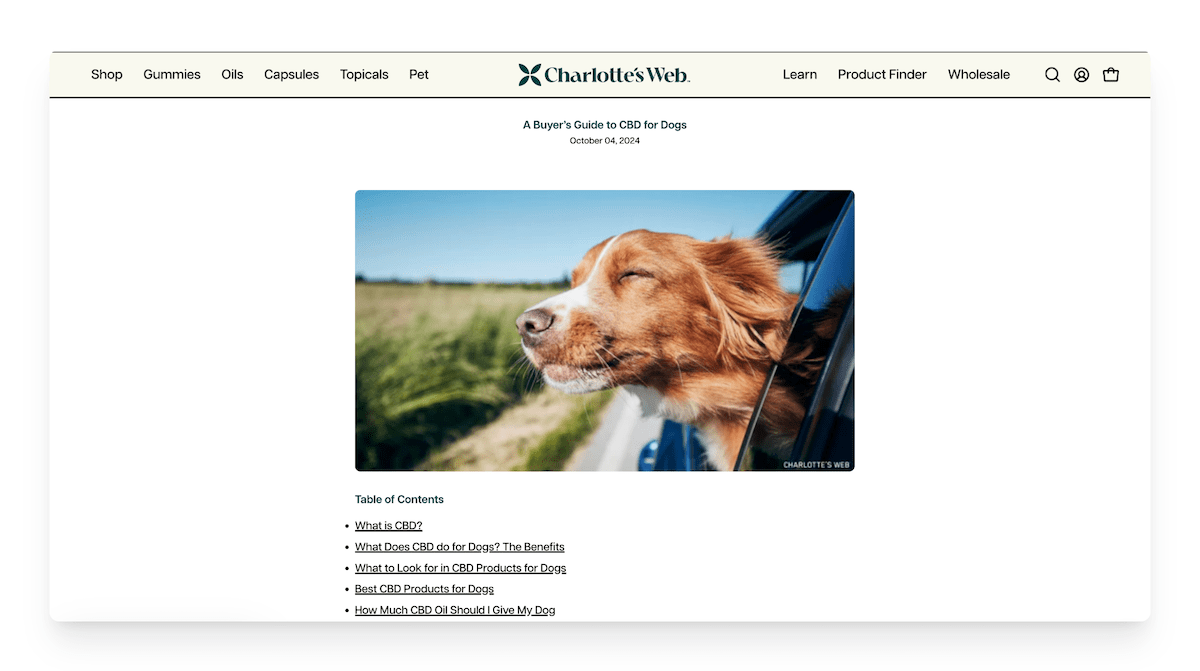
Blog post on the Charlotte’s Web website, targeting the subject of CBD for dogs
- Concentrate on content
In order to help your CBD business stand out from the competition, concentrating on content marketing is a must.
Providing informative, accurate, and engaging content on a regular basis will not only help to improve your SEO but also your brand authority and awareness.
Think about using different types of content marketing, like blog posts, social media, infographics, videos, ebooks, etc. to appeal to a variety of consumers and generate interest in your business.
Source: Neurogan
The content you create and share can be an excellent opportunity to clear up misconceptions about CBD and educate your audience about various CBD topics concerning, for example, possible benefits and side effects, the different kinds of products available, the general help industry, correct usage, and more.
- Work with influencers
Influencer marketing can be a very powerful strategy for increasing your reach on social media and beyond, especially if your business is relatively new.
It entails collaborating with somebody who has a large number of followers and is well known in your industry. In exchange for free products and/or financial compensation, this person will promote your products to their audience.
Source: cbdMD
Of course, when searching for credible influencers, be sure that the people you opt to work with understand and agree to follow the local laws concerning the messaging for CBD products.
Important challenges CBD businesses encounter
Launching your own CBD business is exciting and offers plenty of sales potential. Nevertheless, it’s crucial to be aware of the difficulties that many entrepreneurs in the CBD industry come across.
Regulatory uncertainty
CBD businesses operate in a complex and evolving legal landscape.
In the US, for example, while hemp-derived CBD is federally legal, individual states impose their own rules on production, labeling, and sale. International laws vary even more.
The FDA has not fully regulated CBD as a dietary supplement, creating ambiguity. This uncertainty makes long-term planning difficult, exposes businesses to legal risks, and often requires costly compliance measures or legal consultations to navigate changing laws.
Banking and payment processing
Many banks and payment processors classify CBD companies as high-risk due to the product’s association with cannabis and regulatory ambiguity.
As a result, CBD businesses often struggle to open bank accounts, secure loans, or maintain reliable credit card processing. This can lead to interrupted transactions, frozen funds, or higher processing fees.
Lack of access to mainstream financial services forces many companies to rely on smaller, specialized firms, which may offer limited support or charge premium rates.
Marketing restrictions
CBD companies face strict advertising limitations on platforms like Google, Facebook, and Instagram, which ban or heavily restrict CBD-related promotions. This makes it difficult to reach new customers through traditional digital marketing channels.
Furthermore, claims about CBD’s health benefits are closely scrutinized by regulators, so messaging must be carefully crafted.
Businesses must therefore find alternative methods—such as SEO, influencer marketing, or educational content—to build brand awareness while staying compliant with advertising and labeling regulations.
Get started with your CBD business today!
There’s no doubt that creating a successful CBD business requires a high level of dedication and lots of hard work. It’s certainly not without its unique challenges.
With all the research and preparation involved to ensure a legal operation, the idea of launching an online store that sells CBD products can seem intimidating at first, especially for new entrepreneurs.
That being said, if you’re passionate about CBD and its benefits and want to share your knowledge and expertise with others while earning a profit, starting your own CBD business may be the perfect adventure to embark upon.
Use the tips and guidance in this article to get started, stay up to date with the latest happenings in the industry, and you’re sure to be well on your way to ecommerce success!


